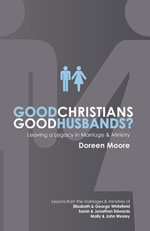Good Christians = Good Husbands? Part 1
 I've been wanting to read Good Christians, Good Husbands? for a while, so when my husband brought it home from the library, I was eager to read it. This book by Doreen Moore looks into the marriages of three godly men who did much good for the Kingdom of God, namely, John Wesley, Jonathan Edwards, and George Whitefield.
I've been wanting to read Good Christians, Good Husbands? for a while, so when my husband brought it home from the library, I was eager to read it. This book by Doreen Moore looks into the marriages of three godly men who did much good for the Kingdom of God, namely, John Wesley, Jonathan Edwards, and George Whitefield.The fundamental issue she brings to light is whether a man's public ministry should take precedence over his family, or whether time spent serving his family should equally be considered the "work of the Lord." With each of these men she seeks to define their convictions regarding the role of a husband and father, their convictions regarding the role of a minister of the Gospel, and then how these convictions shaped their marriages.
She also touches on their wives, specifically, how they responded to their husband's convictions and how these women contributed to the marriage. This book is certainly useful for both men and women who seek to have a God honoring marriage, and who desire to find a proper balance between family and public ministry.
According to Moore, John Wesley believed that the Methodist cause was of a higher priority than marriage (p. 30). His public ministry was "the work of the Lord," while marriage was seen as a distraction from this work. He apparently told his brother two weeks after he married that "he had no more thought of a woman than for any other being: that he married to break down the prejudice about the world and him" (p.34). In other words, he married Molly to enhance his reputation, but had no more affection for her than any other person (p.34). I won't go into all the gory details of their marriage here, but it is enough to say that it ended in separation and he recorded in his journal that he did not even know that his wife died until "a day or two after" (p.58).
When George Whitefield proposed to a woman, he wrote to her parents, "For, I bless GOD, if I know any thing of my own heart, I am free from that foolish passion, which the world calls LOVE." To the woman he wrote, "The passionate expressions which carnal courtiers use, I think ought to be avoided by those that would marry in the LORD. I can only promise, by the help of GOD, to keep my matrimonial vow, and to do what I can towards helping you forward in the great work of your salvation." Moore goes on to say, "In our day and age, we might find his proposal formal and unaffectionate. Perhaps the young woman did too. Shortly after, she married... another man!" (p.68).
When Whitefield did marry, it seems that his wife was fully aware of his views on romance, and that he placed his public ministry above his marriage. According to Moore, she had to bare alone "frequent sickness, probably four miscarriages, and the death of her son" while her husband was pursuing his itinerant ministry (p. 85). However, she seemed fully accepting of this and as a result they enjoyed a cordial marriage.
When men such as John Wesley and George Whitefield, and others like William Carey and David Livingstone, have done so much good for the Kingdom, it can be easy to overlook the fact that they neglected or deserted their families. (David Livingstone only lived with his wife for 4 out of their 17 years of marriage) (p.11). One would think that if they had taken more time to care for their families, they would not been able to accomplish as much for God. However, Moore makes the good point in her conclusion that "we must remember, we only know what happened. We do not know what would have happened if another course was followed." She cites the example of Charles Wesley who "slowed down his labors for his family," giving him opportunity to write more hymns and pass down this "rich heritage" to the church (p.153).


0 Comments:
Post a Comment
<< Home